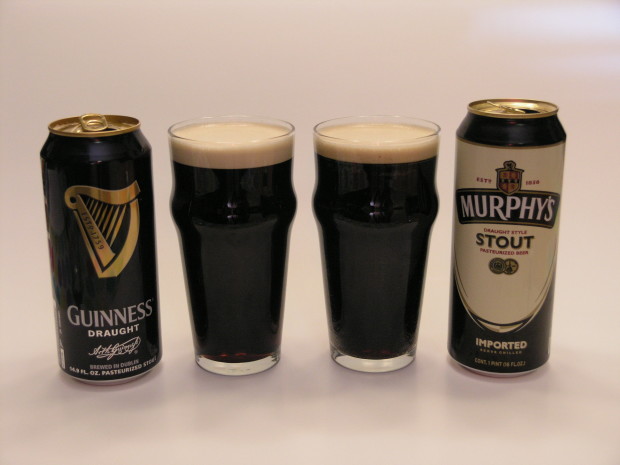You have no items in your cart. Want to get some nice things?
Go shopping
After five weeks of waiting, the moment has come. Under the cover of darkness, we lift out the barrel from its cavernous location. The deep-brown liquid lurches behind the air-locked, frosted pane of the vessel. How will it be? There is a mild nervousness to this moment. Did we get it right? Please say we got it right. None of us will say it for fear of somehow jinxing ourselves, but there’s a good feeling about this batch.
Beer. Well, specifically, a porter. A deep, hearty, near-sweet dark-brown liquid, and the lifeblood of many a nation. Porter, and its burlier brother stout, remain an enduring link between London and Ireland, and locally distinctive varieties are celebrated in both places. If London was the birthplace of this tenebrous ale [1], however, Ireland became its home – and it remains serious business to this day [2]. It’s no coincidence the Irish Rover set out to New York with seven million barrels of it.
In Mallow, Co. Cork, where I spent much of my childhood, the drinking of stout was a serious business. No self-respecting Corkman would be caught dead with his hand wrapped around a glass of Guinness. It had to be Murphy’s. You could try and order a Beamish, but let’s just say that you wouldn’t start making friends fast. You could read a person’s allegiances by their choice of the dark stuff. There is no guessing where those of the family-run Murphy’s lay, built on the site of a holy well [3]. It was a catholic drink in both senses of the word: a universal drink for the workers and the rebels, who were, for the most part, Catholics. Had he not lived in Dublin, the heartland of Guinness, I would swear blind that Flann O’Brien had written The Workman’s Friend for a pint of Murphy’s. The poem, featured in At Swim Two Birds, explores the comfort of the velvet brew in the face of all kinds of quotidian miseries with the refrain “a pint of plain is your only man” [4]:
When food is scarce and your larder bare
And no rashers grease your pan,
When hunger grows as your meals are rare –
A pint of plain is your only man.
The link here isn’t coincidental: the poem could well be a microcosm of Ireland’s modern history. Since the eighteenth century, the fortune of the Irish people has run hand-in-hand with that of its brewing industry:
When things go wrong and will not come right,
Though you do the best you can,
When life looks black as the hour of night –
A pint of plain is your only man.
And go wrong they did, for a while.
❦
Throughout the long struggle for Irish independence, stout, and the breweries that made it, played a strategic role on both sides. At least four pubs tied to the Murphy’s brewery were fire-bombed and destroyed through UK government action in 1920 [5] – with a number of British Auxiliary Officers leading charges on public houses, looting drink in the process [6]. British military officers joined in the looting at Murphy’s [7] during this period of incredible British state-sanctioned violence that came to be known as the Burning of Cork. (In the years that followed, Lady Carin Beamish, descendant of the Beamish dyntasty, had married Hermann Goering and joined the Nazi party, rendering the shade of that particular stout somewhat darker.)
Two decades later, after Ireland had gained de facto independence, stout proved to be vital to de Valera in thwarting Churchill’s efforts to punish the young country for its stance of neutrality during the Second World War – a stance that Churchill saw as a betrayal of the terms set out in the Anglo-Irish Treaty [8]. Ireland’s lack of ships and dependence upon British trade was a cause of great concern for the Irish government. De Valera reflected on the situation mournfully: “No country had ever been more effectively blockaded because of the activities of belligerents and our lack of ships, most of which had been sunk, which virtually cut all links with our normal sources of supply” [9]. In a letter from the Secretary of the Department of External Affairs to de Valera in August 1940, it was noted that a German blockade would “draw attention to the vital importance of trade with Britain to our national economy” [10]. Churchill was not unaware of this, and throughout 1941 attempted “to deliver a death blow” to the Irish economy by completely cutting off its supply of agricultural feed and fertilisers [11] (integral to de Valera’s agrarian dream of an Ireland filled with “cosy homesteads”[12]), as well as petrol and coal.
The misery of the squeeze of Churchill’s measures can be felt in the letters of John Betjeman, writing from Dublin during his time as a press attaché: “All pubs are the same. Guinness Good. Sherry good. No wine. No coal. No petrol. No gas. No electric. No paraffin.” [13] The key to de Valera’s success, Dr Evans claims, lies here. Ireland may not have had much, but it did have Guinness. Despite reservations about a group that was perceived as an “Anglo brewing dynasty … viewed with suspicion by officials …who worried that the company’s sympathies lay with England” [14], de Valera knew the drink was a crucial ingredient in the maintaining of the spirits of troops over the Northern border [15]: “…by 1942, with tens of thousands of thirsty American and British troops in Northern Ireland requiring alcohol to sustain morale, Ireland halted Guinness exports. It only revived them in return for tractors and agricultural chemicals from Britain.” [16][17].
❦
For all the historical and political significance and differences between Ireland’s major stout-brewing dynasties, little difference remains between them today. Both Beamish and Murphy’s are now run by Heineken International. Murphy’s was taken over in 1983, and the Beamish and Crawford Brewery closed in 2009. In a strange twist of historical irony, Beamish is now brewed at the former Murphy’s plant alongside its historic rival.
Despite concerted drives by Heineken to market both stouts internationally, neither has managed to make major inroads on the Guinness global market share. Last year alone, Heineken sealed a £20 million sponsorship deal that would make Murphy’s the exclusive drink of the Rugby World Cup. The story was spun in the Daily Mail and subsequent churn articles as a “ban” inflicted by Heineken on Guinness “despite [its] being favourite with rugby fans”. Despite the claims to the contrary, Heineken is reported to have lost out from the deal. Given the prominent brand imagery throughout some of these pieces, one can but wonder where the ‘news’ of this otherwise anodyne deal might have come from.
The battle of the big brands over revenues brings to mind the words of Sandor Katz in The Art of Fermentation: “Industrial brews have captured ever-growing market shares, but with economic repercussions…mass-producers of food concentrate wealth, erase cultural difference, render vital cultural knowledge and skills obsolete, breed dependency, and decontextualize our food” [18]. Given the declining domestic market for stout [19], one can only hope that these mighty historical markers don’t get left in Heineken’s store cupboard of owned assets to decline and gather dust.
But there is hope, as, thankfully, there’s far more to Irish stout than the trinity of Guinness, Murphy’s, and Beamish. As Ireland’s traditional pubs (and the brewers they were tied to) started to fall into decline, people in Ireland started to do something about it. Lamenting their stakes living in “a land rich in [a] culture of drinking but totally dominated by large global drinks companies”, Liam LaHart and Oliver Hughes opened Ireland’s first independent “brew pub” [20]. The group, Porterhouse, specialises in the production of stout (a “plain”, nonetheless, like that mentioned in the Flann O’Brien), and has won multiple gold medals in the Brewing Industry International Awards over the years [21].
Though the prevalence of stout may appear to be on the wane in Ireland, craft beer is booming. In 2013, the production of beer by Irish microbreweries grew by 32% in volume 49,000hl, only to expand by a further 35% in 2014 to 71,000hl [22]. Hopefully with the support of organisations such as Beoir – Ireland’s answer to CAMRA, founded in 2010 – we will continue to see these endeavours blossom and flourish.
(Our brew did turn out well incidentally, though I finished this article with a bottle of McGargles Uncle Jim’s stout,)
[1] Oliver, G. (2012). The Oxford Companion to Beer. New York: Oxford University Press, p.494.
[2] Drinksindustryireland.ie, (2016). Beer a fifth of all beverage exports. [online] Available at: https://www.drinksindustryireland.ie/beer-a-fifth-of-all-beverage-exports/ [Accessed 4 Jan. 2016].
[3] Corkancestry.com, (2016). James Jeremiah Murphy. [online] Available at: https://www.corkancestry.com/Families%20of%20Note/Murphy/JamesJeremiahMidletonBrewery.aspx [Accessed 7 Dec. 2015].
[4] O’Brien, F. At Swim-Two-Birds.
[5] Oliver, G. (2012). The Oxford Companion to Beer.
[6] Archive.org, (2016). Full text of “Who burnt Cork City? a tale of arson, loot, and murder; the evidence of over seventy witnesses”. [online] Available at: https://archive.org/stream/whoburntcorkcity00dubl/whoburntcorkcity00dubl_djvu.txt [Accessed 7 Jan. 2016].
[7] Ibid.
[8] Gibbons, F. (2000). How verse saved poet laureate from the IRA. [online] The Guardian. Available at: https://www.theguardian.com/uk/2000/apr/22/books.booksnews [Accessed 2 Jan. 2016].
[9] Widely attributed to De Valera’s Christmas 1940 broadcast to the United States, although I was unable to find a copy of the recording itself. I could, however, find one reference to the speech in Forde, F. (1981). The long watch. Dublin: Gill and Macmillan.
[10] https://www.fusio.net, F. (1940). Cover letter and Memorandum by Walshe from Joseph P. Walshe – 19 August 1940 – Documents on IRISH FOREIGN POLICY. [online] Difp.ie. Available at: https://www.difp.ie/docs/1940/Impact-of-German-blockade-on-Britain-on-Irish-trade-and-shipping/3264.htm [Accessed 9 Jan. 2016].
[11] Evans, B. (2014). Guinness Saved Ireland. [online] drbryceevans. Available at: https://drbryceevans.wordpress.com/2014/09/06/guinness-saved-ireland/ [Accessed 7 Jan. 2016].
[12] de Valera, É. (17 March 1943). “That Ireland which we dreamed of.”. In: R. Aldous, ed., Great Irish Speeches, 2nd ed (2009).
[13] Betjeman, J. and Lycett Green, C. (1994). John Betjeman letters. London: Methuen, p.314.
[14] Evans, B. (2015). Food and Drink at the 1939 World’s Fair: National Rivalry and Irish Aspiration. In: N. Teughels and P. Scholliers, ed., A Taste of Progress: Food at International and World Exhibitions in the Nineteenth and Twentieth Centuries, 1st ed. Ashgate Publishing, Ltd., p.233.
[15] Evans, B. (2014) Ireland during the Second World War: Farewell to Plato’s Cave Manchester University Press, pp. 25-26, p.179..
[16] Evans, B. (2014). Guinness Saved Ireland. [online] drbryceevans. Available at: https://drbryceevans.wordpress.com/2014/09/06/guinness-saved-ireland/ [Accessed 7 Jan. 2016].
[17] Evans, B. (2015). Food and Drink at the 1939 World’s Fair: National Rivalry and Irish Aspiration. In: N. Teughels and P. Scholliers, ed., A Taste of Progress: Food at International and World Exhibitions in the Nineteenth and Twentieth Centuries, 1st ed. Ashgate Publishing, Ltd, p.233.
[18] Katz, S. and Pollan, M. (2012) . The Art of Fermentation. Chelsea Green Publishing Co, p.256.
[19] Notte, J. (2016). Guinness can’t afford to alienate loyalists as beer sales fall. [online] MarketWatch. Available at: https://www.marketwatch.com/story/guinness-cant-afford-to-alienate-loyalists-as-beer-sales-fall-2015-11-12 [Accessed 12 Jan. 2016].
[20] Theporterhouse.ie, (2016). Porterhouse – About. [online] Available at: https://www.theporterhouse.ie/about.php [Accessed 6 Jan. 2016].
[21] Theporterhouse.ie, (2016). Porterhouse. [online] Available at: https://www.theporterhouse.ie/beers-plain.php [Accessed 6 Jan. 2016].
[22] https://www.accaglobal.com, A. (2016). Ireland’s craft beer industry | ACCA Global. [online] Accaglobal.com. Available at: https://www.accaglobal.com/vn/en/member/accounting-business/corporate/craft-beer.html [Accessed 10 Jan. 2016].

About Concepta Cassar
Concepta is a journalist, forager and food writer, with a particular interest in food anthropology, sustainability, and agricultural affairs. Her recipes have been featured in the Guardian, and she writes for a number of organisations, including BuzzFeed, Aftertastes, and the Soil Association. Her other great loves are literature and modern languages. Concepta speaks French and Italian, and has a working knowledge of Spanish and Russian.





Here I am in the quest for the site for getting help in windows 10 as I am suffering from hurdles after getting my windows upgraded. Also i have found out the solution which is before you.